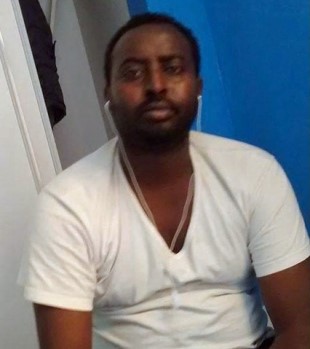

Wednesday 1 January 2025
“Abdirahman Abdi’s death haunts us eight years after the fact: Will an inquiry change anything?”
by
Kwaku Kusi-Appiah
Wednesday 1 January 2025
——————————————
“Inquest recommendations, too little too late.”
Lawrence Greenspon
“Social injustice is killing on a grand scale.”
Michael Mermot
“We don’t want to see Targets burning. We want to see the systems
that sets up systemic racism burned to the ground.”
Killer Mike, aka Michael Render
——————————————–
Abstract
In June 2016, Abdirahman Abdi died after an encounter with Ottawa Police officers. This incident sparked outrage and calls to dismantle systemic racism. Eight years later, this paper revisits Abdirahman Abdi’s case, exploring the complex intersections of mental illness, law enforcement, racism, and social determinants of health. Through this analysis, we underscore the urgent need for systemic reforms to address the disproportionate negative impact of policing on racialized individuals, particularly those with mental health conditions, and advocate for the removal of systemic barriers enabling such abuses.
Introduction
This paper argues that despite multiple inquests and recommendations, systemic racism and inadequate responses to mental health crises persist in Canadian policing, needing comprehensive and enforceable reforms (Wortley, & Owusu-Bempah, 2016). For instance, the 2017 inquest into the death of Andrew Loku, a Black man who died after an encounter with Toronto Police (Bascaramurty, 2017), resulted in thirty-nine recommendations, but this did not stop systemic racism in Canada (Mensah et al., 2021). Similarly, the 2020 report by the Ontario Human Rights Commission on racial profiling and discrimination by the Toronto Police Service highlighted the need for sweeping reforms (Government of Ontario, 2024); however, substantial changes have yet to be realized.
Other examples like the Royal Commission on the Donald Marshall Jnr. prosecution (1989) and the inquiry into the death of Frank Paul (2010) prove that inquests can be used to deflect criticism and avoid meaningful change (Butts, 2024; Razack, 2012). For example, on October 3rd. 2017, Professor Alok Mukherjee pleaded with the Ontario government to implement recommendations identified by the coroner’s inquest on the death of Andrew Loku. Alok Mukherjee said:
“Coroner’s inquest recommendations are meant to prevent further deaths. Yet, deaths at the hands of the police have continued, and recommendations made by the coroner’s juries go unheeded…”
(Mukherjee, A., 2017)
Today, the systemic issues that led to the injustices remain, and are even getting worse.
Given this history, it is understandable that many in the Black community in Ottawa view the Abdirahman Abdi’s inquest as a smokescreen, designed to placate the community rather than drive meaningful change.
Abdirahman Abdi’s case
While inquests are crucial for shedding light on systemic issues and making recommendations for improvement, the actual impact of these inquiries can be limited. In the case of Abdirahman Abdi, a 38-year-old Black man who died after his arrest by Ottawa Police on June 25, 2016, the announcement of a coroner’s inquest after eight years of his death has been met with suspicion. As an inquest, its primary goal is to examine the circumstances surrounding Abdirahman Abdi’s death and make recommendations to prevent similar incidents in the future (Giwa et al., 2021). But many believe it is an attempt to appease the community without addressing the systemic issues that led to Abdirahman Abdi’s murder.
Social Determinants of health while Black
Abdirahman’s experiences, highlight the interplay between social determinants of health (e.g., education, employment, housing, law, and order) and mental health outcomes of marginalized groups globally (Raphael, 2009; Marmot & Wilkinson, 2006). Research suggests that individuals with lower incomes are disproportionately more likely to experience housing insecurity and police encounters. A study in 2020 found that Black Canadians had a median employment income of $43,000, compared to $53,000 for the general population (Ng, & Gagnon, 2020, 2020). Similarly, Black Canadians are more likely to experience housing insecurity. A 2020 report shows that 24.1% of Black Canadians experienced core housing need, compared to 12.5% of the general population (Wilkinson et al., 2023). In 2019, life expectancy at birth for Black Canadians was 78.4 years, compared to 81.1 years for the general population (Arora et al., 2019). This stark difference underscores the persistent inequalities faced by Black Canadians in accessing essential services and achieving comparable health outcomes.
Abdirahman Abdi’s death shed light on his life, including his mental health struggles and his experiences as a Black man in Ottawa. His death also highlights the historical and ongoing challenges of policing individuals with mental health conditions while Black. Research has consistently shown that individuals with mental health conditions are disproportionately represented in altercations with law enforcement, often resulting in tragic outcomes (Giwa et al., 2021; Livingston, 2016; Bourouh, 2006). There is ample evidence that racism is embedded in institutional policies and practices, perpetuating systemic inequalities (Delgado & Stefancic, 2012). Obviously, Abdirahman Abdi’s racial identity played a role in the police response to his mental health crisis (Mensah et al., 2021).
Inquests & change are not synonymous.
While inquests are essential for uncovering the facts surrounding specific incidents, they do not automatically result in the systemic reforms necessary to prevent future tragedies. Effective change requires the active implementation of inquest recommendations, which is often hindered by factors such as lack of enforcement, limited resources, and entrenched systemic barriers.
It is essential to continue advocating for change and pushing for the implementation of recommendations from inquiries like the Abdirahman Abdi’s inquest. By doing so, we can work towards creating a more just and fair society for all. Some potential recommendations that could arise from Abdirahman Abdi’s inquest include: 1) Improved police training; 2) Mental health support; and 3) Improved and committed community engagement.
First, how police officers are trained, especially around cultural sensitivity and inclusion, must be revisited. When a group of people are believed to be a nuisance and intimidating, the result is a rush to judgement on the part of police officers who are supposed to protect citizens and not to harm them. Secondly, there need to be increased and improved access to mental health services and support for individuals struggling with mental health issues. Thirdly, there need to be strengthened relationships between law enforcement and the Black community in Ottawa, through initiatives such as community outreach programs and cultural competency training as part of all socialization processes in the national capital and beyond.
Why Abdi’s inquest might not lead to change
Several reasons explain why Abdirahman Abdi’s inquest might not lead to significant changes. They include: 1) lack of enforcement; 2) mainstream resistance to systemic change; 3) limited financial resources; and 4) entrenched systemic racism (sometimes internalized by Black people themselves).
Inquiries and inquests often rely on voluntary compliance from stakeholders rather than possessing the authority to enforce change. Secondly, systemic change is challenging to implement, especially when it necessitates a fundamental shift in institutional culture or practices. Thirdly, implementing recommendations from an inquest can require substantial resources, which may not be allocated or prioritized. Finally, the issues highlighted by Abdirahman Abdi’s death, such as police brutality and systemic racism, are deeply ingrained and difficult to address without a comprehensive transformation of the system. For instance, despite the recommendations from the 2017 inquest into Andrew Loku’s death, there has been minimal progress in implementing the suggested reforms, demonstrating a lack of enforcement and prioritization.
Without decisive action to dismantle these entrenched barriers, the cycle of injustice and inequality is likely to continue, perpetuating harm within Black communities and undermining societal trust in law enforcement institutions. As succinctly put by Killer Mark, systemic change is what is needed:
“We don’t want to see Targets burning. We want to see the systems that sets up systemic racism burned to the ground.”
(Killer Mike, 2014, St. Louis, Missouri).
Conclusion
Abdirahman Abdi’s death offers a critical lens through which to examine the intersections of mental illness, law enforcement, racism, and social determinants of health. This analysis underscores the need for systemic reforms to address the disproportionate negative impact of policing on racialized individuals with mental health conditions. Issues such as improved police training and response strategies, increased access to mental health services, and addressing social determinants of health, must be implemented to prevent similar tragedies in the future. The success of any recommendations from any inquest in bringing about positive change will depend on the willingness of stakeholders to implement recommendations and work towards a more just and fair system for all.
Works Cited
Arora, Anil, et al. (2019). A Data Story: Ethnocultural Diversity and Inclusion: A Discussion with Statistics Canada. Statistics Canada / Statistique Canada, 2019.
Bascaramurty, D. (2017). Bias against Black people linked to police use of lethal force, study suggests. Globe and Mail, July 17, 2017.
Booth A, Scantlebury A., Hughes-Morley, A., Mitchell, N., Wright, K., Scott, W., & McDaid C. (2017). Mental health training programmes for non-mental health trained professionals coming into contact with people with mental ill health: a systematic review of effectiveness. MC Psychiatry, 25;17(1):196.
Bourouh, O. (2006). Racial profiling in Canada: Challenging the myth of ‘a few bad apples.’ Canadian Ethnic Studies, 38(2), 193–194.
Butts, E. (Forthcoming). Donald Marshall Jr. In The Canadian Encyclopedia.
Delgado, R., & Stefancic, J. (2023). Critical race theory: An introduction (vol. 87). NyU press.
Faubert, S. (2023). An exploration of encounters between people with lived experience of mental illness and police officers (Doctoral dissertation). University of Windsor. https://repository.uwindsor.ca/islandora/object/uwindsor%3A3739/datastream/PDF/view.
Giwa, Sulaimon, et al. (2020). “Racial Erasure: The Silence of Social Work on Police Racial Profiling in Canada.” Journal of Human Rights and Social Work, 5(4): 224–35.
Government of Ontario (2024). From impact to action: Final Report into anti-Black racism by the Toronto Police Service.
Kesic D, Thomas S., Ogloff J., & Aust, N. (2010). Mental illness among police fatalities in Victoria 1982-2007: case linkage study. Journal of Psychiatry, 44(5):463-8.
Livingston, J. (2016). Police encounters with people with mental illness: A review of the literature. Journal of Forensic Psychology Practice, 16(2), 147–163.
Marmot, M., & Wilkinson, R. (2006). Social determinants of health. Oxford University Press.
Mensah, J., Firang, D., Williams, C., & Afrifa, M. (2021). Racial Discrimination in the Canadian Criminal Justice System. Canadian Social Work Review / Revue Canadienne de Service Social, 38 (63-86). Published by Canadian Association for Social Work education (CASWE).
Ng, E. S., & Gagnon, S. (2020). Employment gaps and underemployment for racialized groups and immigrants in Canada: current findings and future directions. Toronto: Public Policy Forum.
Raphael, D. (2009). Ch.1: Introduction to the Social Determinants of Health.In Social
Determinants of Health (2nd Ed). Canadian Scholar’s Press, Toronto. (P. 2-19).
Razack, S. (2012). Memorializing Colonial Power: The Death of Frank Paul. Law and Social Inquiry, 37(4).
van den Hondel, K., Saaltink, A., Bender, P. (2016). Eight years of psychiatric examination of detainees by forensic physicians in the Netherlands. Journal of Forensic Leg Med. 44:116-119.
Wilkinson, A., Muhajir, K., Bailey-Brown, P., Jones, A., & Schiff, R. (2023). Filling in the gaps: examining the prevalence of Black homelessness in Canada. Housing, Care and Support, 26(3/4), 103-114.
Wortley, S., & Owusu-Bempah, A. (2016). Crime and justice: The experiences of Black Canadians. In B. Perry (Ed.), Diversity, crime, and justice in Canada (2nd ed., pp. 140–167). Oxford University Press.
—
Dr. Kwaku Kusi-Appiah holds a doctorate in political ecology and the environment from Carleton University, where he teaches and conducts research in the domain of political ecology, water access and its intersection with the environment. He also supervises postgraduate students from Algeria, Malawi, and Ghana. His career spans many years of university tutoring and leadership in diversity advocacy, such as serving as senior advisor to the Mayor of Ottawa on diversity issues, revitalizing Black History Ottawa, and contributing to international development projects like providing educational resources to Rwandan schools. He has also served as a visiting professor at Mzuzu University in Malawi, engaging students and NGOs on water and social justice issues. Dr. Kusi-Appiah also co-founded the Canada Education Management Agency to support international education.

